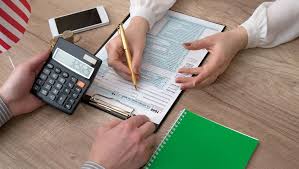Tips for hiring a tax preparer
Thinking of hiring a tax preparer to file your income tax return? Before you decide, consider all the Tax Department has to offer to ease the filing process:
- free electronic filing options;
- free tax assistance sites statewide where department volunteers can help walk you through the electronic preparation and filing process; and
- income tax forms that perform basic math to help reduce errors on your return. You can fill in these forms online and then print them out for your records.
If you do decide to hire a tax preparer, ask the four simple questions below to ensure the preparer you hire is, as most are, honest and in compliance with the tax law. Don’t fall prey to a tax preparer scam.
While taxes may seem difficult, you don’t want just anybody who advertises tax filing to prepare your return. Unfortunately, the tax preparation industry isn’t regulated, and some tax businesses are run by untrained or dishonest people.
You may be tempted to go to businesses that are known to generate large tax refunds. However, be careful and make sure that the tax return is prepared accurately. Ultimately, you (as the tax filer) are held responsible if there are errors or negligence associated with the return.
Luckily, there are steps you can take to ensure that your tax return is accurately prepared by a trained and experienced tax preparer.
Are you registered with the IRS and New York State?
Tax preparers registered in New York State must meet continuing education requirements and minimum qualifications. Attorneys, certified public accountants, and IRS enrolled agents don’t need to register, but do have other professional requirements.
Ask to see the preparer’s registration certificate or proof that they aren’t required to register. You can also see Verify your tax preparer to search for your tax preparer in an online database of authorized preparers.
How much will your services cost?
Ask to see a list of fees. Fees should be directly related to the services provided—not the refund amount. Also, by law, preparers may not charge you extra for electronically filing your New York State return.
How will I receive my refund
Your refund should never be deposited into your preparer’s bank account. The fastest and safest way to receive your refund is to have it directly deposited into your bank account. However, the Tax Department can also mail you a refund check.

Check the preparer’s qualifications.
Unfortunately, there are no regulations for paid tax preparers, so you need to do your own research and take precautions. Make sure your tax preparer has a Preparer Tax Identification Number (PTIN). A PTIN is required for tax preparers who charge for their services and indicates that the preparer has registered with the IRS. The IRS has a directory where you can verify PTINs and credentials.
Ask about their training. At the minimum, make sure that they have passed a state or federal tax certification exam. The IRS has a guide to understanding tax preparer credentials and qualifications that can help you in finding the right preparer.
Choose a tax preparer who can be contacted later.
If the IRS has questions about the tax return, make sure there is someone to contact for follow-up. Check out the preparer’s reputation with others in the community and get the preparer’s address and telephone number.
Do not leave original documents with the tax preparer.
If the tax preparer needs to work on your return when you are not present, make sure they have scanned or copied the necessary information. Always take your original documents with you.
Insist that the commercial tax preparer sign the tax return in pen.
This is required by federal law. The preparer’s address and Preparer Tax Identification Number (PTIN) are also required on the tax return.

Consider tax preparation software.
If you’re technically savvy, tax preparation software is probably a cheaper and more reliable option than a tax preparer, too. Quite often, tax preparers merely use some tax preparation software package to file your taxes for you anyway, so if you’re not afraid of installing a software package and typing in the numbers yourself, you should just use a package like TurboTax. The software essentially walks you through a questionnaire, telling you where to find all the answers that you need, then fills out the tax forms correctly as you type in the numbers. Again, if your tax situation is relatively simple – typical W-2s and 1099s and no complex business arrangements – filing it yourself with the aid of software that makes it easy is probably a better choice.
The time to call in a tax preparer is when things are a bit more complicated, such as when you’ve bought and sold a number of investments or have business holdings or business income, or if you’ve received money from a trust or other atypical sources. While software can still guide you through these situations, it doesn’t always find the best way to organize them and file them, and the eye of a knowledgeable tax preparer can really make the difference here.

Search for free tax programs.
There are several free government programs that prepare taxes free of charge if you meet an income requirement; go to the IRS’s Free File page for more information. Most will also file your state return as well. If not, check with your state’s Department of Revenue to find out about their programs.
New tax laws can create confusion that dishonest preparers will capitalize on, so taxpayers should always review their return before signing and ask questions on entries they do not understand. Also be sure to get a copy of the return for your records. Finally, do not ever sign a blank tax form or one filled out in pencil!
What Licenses and Certifications Do Tax Preparers Need?
Technically, tax preparers only need a PTIN (Preparer Tax Identification Number) from the IRS in order to legally prepare taxes. However, the IRS encourages taxpayers to choose well-qualified tax preparers, so many tax professionals choose to pursue some of the additional education and credentials listed below.
Different Types of Tax Preparers
Enrolled Agents (EA)
Enrolled Agent status is the highest credential awarded by the IRS to professional tax preparers. These tax professionals must pass a three-part exam and pursue continuing education each year in order to maintain their certification.
Certified Public Accountants (CPA)
CPAs are among the highest credentialed tax professionals. CPA requirements vary slightly by state but most require a bachelor’s degree, some graduate-level education, two years of professional experience, and a rigorous four-part exam.
Note that not all CPAs work as tax professionals.
Other Tax Preparers and Annual Filing Season Program Participants (AFSP)
Non-credentialed tax preparers can still pursue education through the AFSP. This optional program was created by the IRS and “aims to recognize the efforts of non-credentialed return preparers who aspire to a higher level of professionalism.” Participants must obtain 18 hours of continuing education, including a 6 hour Annual Federal Tax Refresher course.